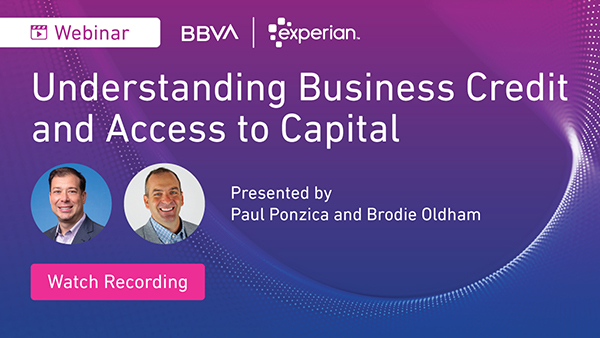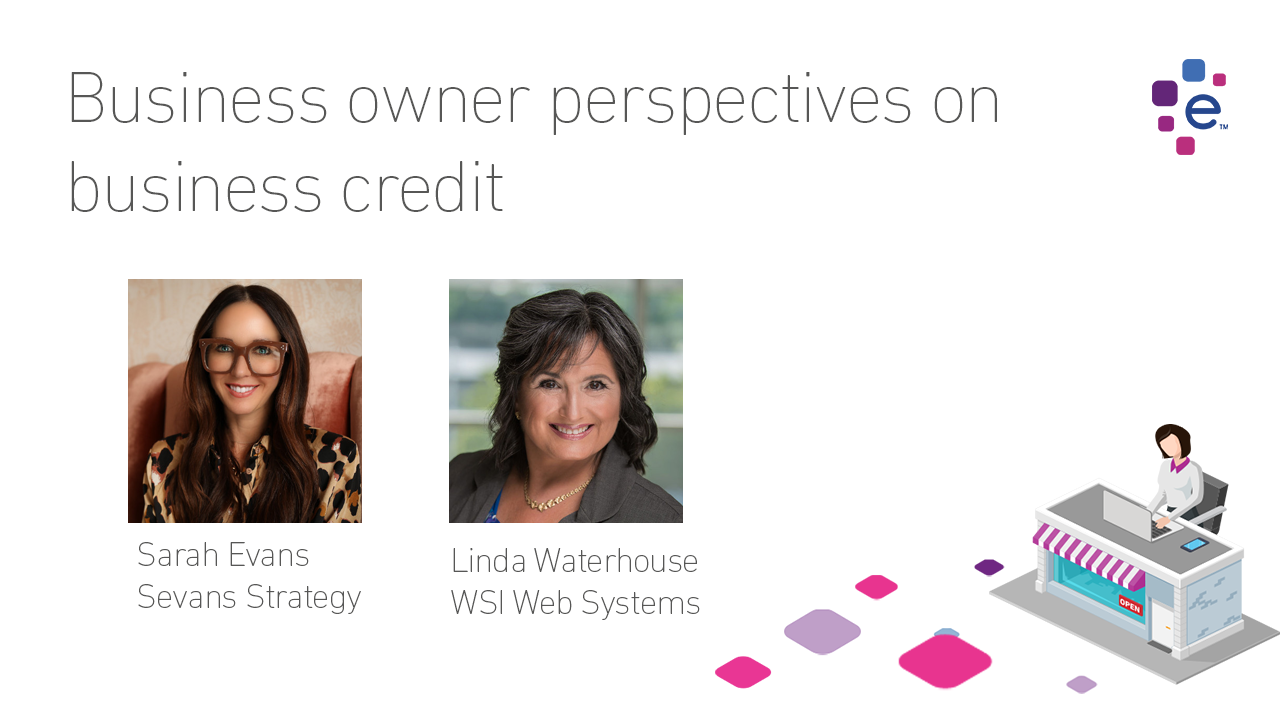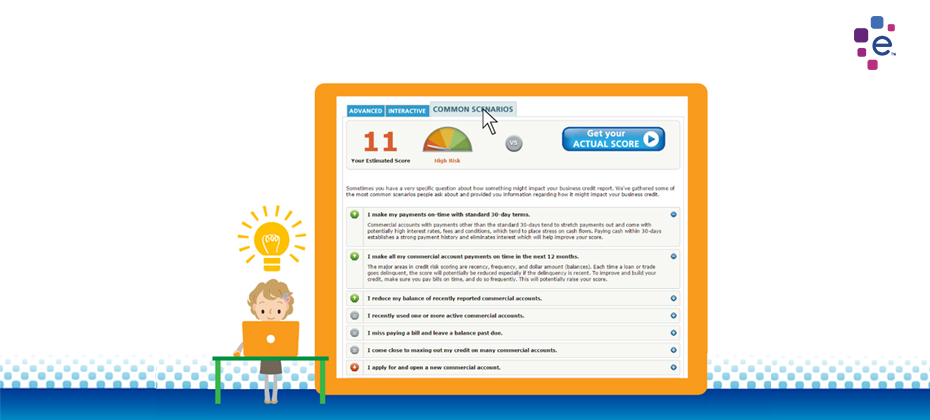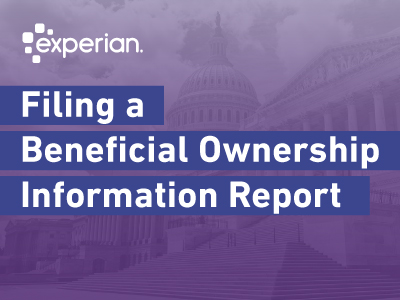Business Credit Education
articles and videos about business credit education

Maintaining a good business credit score should be a priority for all businesses. It helps with securing credit cards, loans and leases, and can aid negotiations for favorable terms with vendors. It can also prevent business owners from having to put their personal assets or creditworthiness on the line by separating their business’s credit from their personal credit reports and scores. What constitutes a good business credit score? Each of the three major business credit reporting agencies uses its own scoring model. Moreover, every vendor and lender is likely to have its own criteria, so there’s really no universal standard for what’s good or bad. There are, however, some guidelines you can use for a general reference. What Is a Good Business Credit Score? To help get some context for your business credit score, you can start by looking at how business credit scoring ranges might correspond to levels of risk. The Federal Reserve’s 2022 Small Business Credit Survey provided a handy definition of risk levels using both personal and business credit scores: While fitting into one of these risk levels doesn’t necessarily translate into absolute success or failure in accessing funds, it can certainly help your odds. In the Fed survey, 62% of low-risk applicants for small-business funding received all of the money they requested, compared with 39% of medium-risk applicants and just 23% of high-risk borrowers. Experian’s Intelliscore PlusSM uses the following ranges to describe risk: How Do Business Credit Scores Work? Business credit scores are similar to personal credit scores in several regards. In both cases, financial institutions and other account owners report your account and payment information to credit reporting agencies. Agencies use this data to create credit reports, which in turn are used to calculate credit scores. A business’s credit score is an indicator of the level of risk it represents when it comes to missing payments or defaulting on debt. Where most modern general-use personal credit scores range from 300 to 850, business credit score ranges can vary. Experian business credit scores range from 1 to 100. An Experian business credit report typically contains identifying information; payment history; public records of judgments, liens or bankruptcies; inquiries; company background; and your business credit score. You can view a sample Experian business credit report to get a sense of how this information appears. As with personal credit scores, the precise formulas used to calculate your business credit score are proprietary. But the factors that contribute to the calculation are known: Number of trade experiences Outstanding balances Payment habits Credit utilization Trends over time Public record recency, frequency, and dollar amount Demographics such as years on file, SIC codes, and business size Where Can I Check My Business Credit Score? The best way to understand your business credit reports and scores is to see them for yourself. Here’s where to go to access your score and report: ● Experian: Visit Experian’s website to access your Experian business credit report or sign up for Business Credit Advantage credit monitoring. Credit monitoring can also help you stay on top of your business’s credit. Experian’s Business Credit Advantage provides access to your current business credit file, sends alerts when any changes occur, and even offers tips for improving your company's credit standing. How to Improve Your Business Credit Score Improving your business credit score generally involves two steps: establishing credit and building on your existing success. Here are a few tips to get you started: Establish your business as a corporation or LLC, so you have a dedicated business identity. If you’re a sole proprietor, apply for an employer identification number (EIN). Work with vendors that report to at least one of the three main business credit reporting agencies. Encourage vendors that don’t to do so. Open credit using your business identity only, even if you have other accounts that rely on your personal credit as a guarantee and even if you have to start small. Utilize your business credit and pay it off on time. Don’t overutilize business credit. At the same time, don’t overdo spending on any account. In the same way that maxing out your personal credit lines can negatively impact your credit score, carrying a balance that’s close to the limit on your business credit can be a drag. Keep credit utilization below 30%, and the lower, the better. Pay on time, every time. Pay early if you can. Separate your business and personal credit. Although securing credit for your business without a personal guarantee can be difficult, avoid personal guarantees on your business lines once you’ve established a strong payment history. Download our free Blueprint for Establishing and Building Business Credit. It contains step-by-step instructions and tips. Finding Room for Improvement Focusing on business credit is a worthwhile practice: Good credit is the key that unlocks funding for growth, resources in an emergency, low-interest rates and great supplier terms to promote efficiency and a host of other building blocks for financial resilience. Check up on your business credit and, if warranted, look for ways to improve your business credit score. To paraphrase an old cliché, you can never be too rich or too creditworthy in business. About the author Gayle Sato Gayle Sato writes about financial services and personal financial wellness, with a special focus on how digital transformation is changing our relationship with money. As a business and health writer for more than two decades, she has covered the shift from traditional money management to a world of instant, invisible payments and on-the-fly mobile security apps. Gayle began her career as a staff writer for Entrepreneur magazine. As an independent publisher, she edited and produced a series of personal finance magazines for credit union members and THINK, an executive magazine for the credit union industry.

Starting a small business can be very hard. Building strong credit for the business takes discipline and a certain amount of intention. In this post, we are going to start by describing two imaginary business owners working hard down on Main Street. Harry runs “Harry’s Hardware & Mercantile”, a busy hardware store. He has been trading with local do-it-yourselfers and contractors since 1973. Over the course of the business lifecycle, he established trade credit (Tradelines) with dozens of companies. Mildred just opened “Millie’s Fabric” next door to Harry’s on a shoestring after she got laid off from her job. She founded Millie’s by borrowing money from friends and family, charging most of her startup costs to her personal credit card. And that is where the paths of these two somewhat different businesses diverge. Harry discovered the benefits of establishing tradelines with his suppliers in the early stages of his business and now runs a resilient profitable business. Mildred is embarking on the difficult challenge of establishing her business and will need to manage her cash flow wisely. Like Harry, she will discover how beneficial tradelines will be to her success as she starts to form relationships with trading partners. What are tradelines and how can they benefit my business credit report? Tradelines or trade information comprises the financial payment obligations that a business has to its creditors, suppliers, and service providers that involve payment terms like Net 15, Net 30, 60 or 90. It means your business has that much time to pay back the balance of what you borrow. So, for example, if your business buys $300 worth of products at Net 30 terms, you have 30 days to pay it back. A business will start to add tradelines over the course of its lifecycle and establishing tradelines early in the life of the business can be very beneficial. Experian gets a lot of questions about how tradelines impact a business credit score, so in this post, we explain how that all works. Things to consider before applying for tradelines Establish a legal entity. In order for any business to establish trade terms with your company, take the steps to establish the business as a legal entity (ie; forming an LLC, or S Corporation), sole proprietors should make sure the business is registered with your Secretary of State. Establish separate bank accounts. Separate bank accounts will help keep finances separate and help your business track accounts payables. Business email and contact information. Your vendor will look for signs of credibility when assessing whether or not your business is legitimate. Having a business email address in the name of the company helps in that effort. Avoid using free email services like Yahoo or Gmail. Establishing a presence for your business on social media such as Facebook, Twitter, Instagram, LinkedIn or YouTube, depending where your customers spend time online. Bootstrapping a business in start-up is becoming more common, but the mistake that many business owners will make is leveraging their personal credit for company expenses. Doing this can hurt the owner’s personal credit, and it will not help to build strong credit for the business. It is much more beneficial to establish the business and start applying for credit in the name of the company. Trade supplier types When your business orders raw materials for your business, or purchases office supplies, you would sign for the goods and receive an invoice, and be provided a period of weeks to pay the balance. If your vendor is reporting to Experian, your payment history good or bad will be reported and be a contributing factor in your business credit score. Experian classifies these tradelines as trade supplier types and groups them into the following categories. Financial loan, line, lease, credit card Supply raw materials, building supply, office Services accounting, marketing, financial services Utilities telecommunications, gas, water, electricity Transportation ground, air transport If you are familiar with consumer credit reports, you should be familiar with financial trades, as they are on our consumer credit reports too. These tradelines include loans, lines of credit, leases, and credit cards. Commercial credit reports also include trades from other supplier types as well. Basically, any business that has a commercial accounts receivable portfolio can provide their information to Experian and can establish a tradeline for their business accounts. To contribute data to Experian, you must be able to export into TXT, CSV or XLS (Excel - saved as comma delimited) and also adhere to encryption guidelines. Data contributors are also required to submit monthly updates. If you are interested in becoming a business data contributor you can find more information about reporting to Experian here. How tradelines are classified and updated The first time Experian gets a trade from a specific data supplier for business, that is considered a new trade. On the next update of that trade, it is reclassified as a regular trade. If there are no updates to a regular trade within 3 months, it becomes an aged trade. A trade falls off the business credit report without an update in 36 months. It doesn’t end there; however, if an update comes in for an existing trade, even for a trade that fell off the business credit report, it becomes a regular trade again. Tradeline credit attributes Experian provides information on the total balance outstanding, total credit and utilization, payment delinquencies as of today, and payment trends over time. With this type of grouping, it’s easy to quickly identify newly added trades, regularly updated trades, and trades that are becoming stale. The tradeline disparity between male-owned and woman-owned small businesses Experian studied 3.1 million small business credit profiles between 2016 and 2018 and found variances in the number of tradelines in male-owned businesses compared to woman-owned businesses as the chart below describes. When we look at trade count and the amount of commercial debt or outstanding balances, we saw a different picture between the two cohorts. On average woman business owners have less than 1 tradeline ( avg. .6 trades) vs male business owners, who average roughly 1.4 commercial tradelines. When you compare the average balances, male business owners carry about $40,000 in commercial credit while women business owners carry about $25,000, a $15,000 difference. This difference in the number of tradelines puts women-owned businesses at a competitive disadvantage. To be competitive small businesses should strongly consider establishing tradelines and making on-time payments to these lines. How can tradelines help small businesses gain access to capital? Tradelines can help your business develop the credibility that matters to banks and other capital lenders. A business credit report that includes multiple, positive lines of trade credit in your company’s name shows that your business pays its creditors in a timely manner. Commercial Lenders review this business credit history of tradelines to determine whether to fund a loan or capital, as well as the interest rates and repayment terms if capital is extended. Businesses with good trade credit often qualify for loans with lower interest rates and better payment terms than those with poor or limited trade credit history. For more information about establishing business tradelines check out our post Building Strong Tradelines For Your Small Business.

Experian and BBVA will be discussing how small businesses can build strong credit to gain access to capital in an upcoming webinar.

Experian has just released the Women in Business credit study, a three year study of around 2.8 million credit files for small business owners. One of the key findings in this study was women business owners, in particular, are reliant upon personal forms of credit, and they may be at a disadvantage through this practice. In the below video, Experian talked with Sarah Evans, owner of Sevans Strategy, a digital PR agency and Linda Waterhouse, owner of WSI Web Systems, to get their perspectives on managing credit, and some of the insights revealed in the Experian study. Click below to learn more about the Women in Business credit study.

Experian Business Information Services was delighted to participate in a #CreditChat tweet chat recently. For the chat, we compiled some answers to frequently asked questions about business credit. Why should you separate business credit from personal credit? How do you establish business credit? Is it possible to build business credit with poor credit How do you get a business credit report? How are business credit scores determined How do you correct or dispute information on your business credit report? How do you get higher limits for your business credit? Five tips for establishing, building and monitoring business credit. Why should you separate business credit from personal credit If your business ever becomes at risk your personal credit score becomes at risk as well. And so maintaining separation can protect your personal credit profile should a financial mishap occur in the company or vice versa. Building separation between the two can also help your business develop the credibility that matters the bank's, lenders, suppliers and partners. How do you establish business credit? One of the first things you can do to establish small business credit is to file your business with your State by forming a corporation or LLC to operate your business under and obtain a FIN or EIN number from the IRS. Of course, comply with the business credit market requirements by obtaining proper licenses state and federal requirements for your business. Also, act as a business by establishing accounts (telephone utilities, leases, loans) all under the business name, not your personal name. Even if you operate as a sole proprietor or as a home-based office, prepare financial statements and a professional business plan. Be visible. Find companies willing to grant credit to your business without a personal guarantee. This is typically referred to as Trade Credit. Ensure that your good payment behavior is reported to Experian. Ask suppliers and other businesses that extend your business credit or payment terms to consistently report your payment history to Experian. Also, borrow and then pay on time. Manage your debt, stay current to your terms by making on-time payments and don't rely just on small business credit cards. Secure terms from suppliers or take out a commercial loan. And lastly, monitor your business credit report regularly check and correct outdated information. Be alert to important credit changes in your company's name. Is it possible to build business credit with poor credit? If you have poor credit, you know, it's never too early to enable healthy management behaviors of separating personal from business credit risk and building business credit. But in the early startup stages, you may need to personally guarantee payments. But, the more you act like a business by establishing accounts in your business name, the more likely it is that you'll be able to negotiate and secure good credit terms without personal guarantees. How do you get a business credit report? Experian offers instant online access to business credit reports at the following websites: Experian.com/mybusinesscredit SmartBusiness Reports.com These sites easily help you monitor your own report or access a report on other businesses you can purchase a single report as needed or save with a subscription to a plan. How are business credit scores determined Experian collects business credit data from a wide range of sources such information is used to create a score that illustrates how your businesses historically met its financial obligations. This helps creditors to decide whether to extend credit to your company. Some of those sources include State Filing Offices, Public Records, Credit Card Companies, Collection Agencies, Corporate Financial Information, and Marketing Databases. If you are curious about the behaviors that impact your credit score you can always access our Score Planner Tool. This is a free tool that Experian offers. You can get in there and do what-if scenarios, modeling your current credit behavior and how that impacts your business credit score. It is a very useful tool and helps you build smart business credit. How do you correct or dispute information on your business credit report? First, you must have a copy of your business credit report. You can download that instantly at Experian.com/mybusinesscredit or SmartBusinessReports.com. Of course, review the details circling any incorrect information and you would submit that to BusinessDisputes@experian.com for investigation. That will open a ticket for your case and return to our self-service Web sites for future access and alerts on the case. How do you get higher limits for your business credit? You should monitor your business credit report and manage the factors that drive a good business credit score. And doing so can help you boost your credit score and improve your credit terms. Five tips for establishing, building and monitoring business credit. Act as a business by maintaining a distinctly separate business credit profile from your personal credit. Avoid surprises. Be proactive in monitoring your business credit score. Stay current on payments to creditors. It seems simple but it is great advice that just pay those bills on time. Don't let them go delinquent Ensure that your good payment history is reported to the credit bureau. Establish some good strong trade credit lines and make sure you're doing business with partners who are reporting to the credit bureau. Use business credit reports to limit your risk of doing business with others such as your business customers suppliers and vendors and partners. We hope these business credit answers have been helpful!

What is good business credit? See how a good business credit score can help strengthen and protect your business.

The commitment required to apply for a business loan may have you on the fence, unsure of whether or not to move forward. You’re not wrong to be cautious

Building and maintaining a strong business credit report takes time, and good fiscal discipline, but many business owners don’t know where to start on their road to establishing business credit. Business credit reports less regulated than consumer credit Business scoring is much less regulated than consumer credit scoring. The process of scoring your business is much more complicated and less clear than the consumer scoring process. For example, additional factors that can impact business risk models include the number of years a business has been operating and its industry type. Don't assume you have a business credit score Just because you have a business, don't assume you have a business credit score. Credit bureaus require a minimum amount of information before they can generate a report and score for your business. To establish your business credit history, encourage your vendors to report your payment history to the business credit bureaus. Many credit bureaus can provide you with information on suppliers who report to them. Keep business credit and personal credit separate Next – let’s talk for a moment about separating your personal and business credit. To build strong business credit, don't rely on your personal credit rating to finance your business. If your business becomes at risk, so will your personal credit score. Keep in mind that many creditors are now looking at scoring tools that consider both personal and business credit to predict small business risk. Business credit reports available to the public It is not widely known that access to business credit scores and reports is not as restricted as personal credit reports. Business credit reports are available to the public, and anyone - including potential lenders and suppliers - can view your business credit report. This makes it imperative to monitor your business credit score and report in an ongoing manner. Also - You can proactively manage your business credit score. Ensure your vendors are reporting your business payment history, and monitor your business' credit on a regular basis. For more information on business credit resources, plus articles and tips on this subject, go to BusinessCreditFacts.com. Learn more about establishing business credit by viewing our series of Business Credit Facts videos. Remember to subscribe to our channel for ongoing updates.

Experian has released a business credit score planner tool to help you run what-if scenarios. It helps you learn behaviors that build strong credit.
